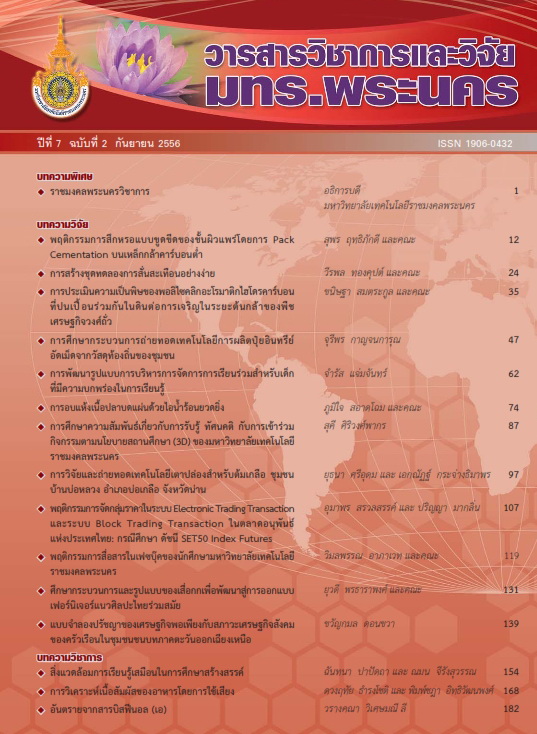แบบจำลองปรัชญาของเศรษฐกิจพอเพียงกับสภาวะเศรษฐกิจสังคมของครัวเรือนในชุมชนชนบทภาคตะวันออกเฉียงเหนือ
Main Article Content
Abstract
บทคัดย่อ
วัตถุประสงค์ของการวิจัยคือ 1) เพื่อสร้างแบบจำลองสมการโครงสร้างเศรษฐกิจพอเพียงกับสภาวะเศรษฐกิจสังคมของครัวเรือนในชุมชนชนบท 2) เพื่อศึกษาขนาดของความสำคัญของแต่ละองค์ประกอบ ของสภาวะเศรษฐกิจสังคม และปรัชญาของเศรษฐกิจพอเพียงของครัวเรือนในชุมชนชนบท และ 3) เพื่อศึกษาถึงขนาดของความสัมพันธ์ระหว่างปรัชญาของเศรษฐกิจพอเพียง กับสภาวะเศรษฐกิจสังคมของครัวเรือนในชุมชนชนบท กลุ่มเป้าหมายคือครัวเรือนชุมชนชนบทในภาคตะวันออกเฉียงเหนือ ใช้เทคนิคการสุ่มตัวอย่างแบบง่ายจำนวน 400 ตัวอย่างและใช้แบบสอบถามเป็นเครื่องมือในการเก็บข้อมูล วิเคราะห์ข้อมูลด้วยสถิติเชิงพรรณนา การวิเคราะห์องค์ประกอบเชิงยืนยัน และแบบจำลองสมการโครงสร้าง ผลการศึกษาพบว่า แบบจำลองที่สร้างขึ้นมีความสอดคล้องกับข้อมูลเชิงประจักษ์อยู่ในเกณฑ์ที่ดี โดยมีค่าไค-สแควร์ () มีค่าเท่ากับ 52.37 และค่าความน่าจะเป็น (p-value) เท่ากับ 0.15491 องค์ประกอบของสภาวะเศรษฐกิจสังคมของครัวเรือนที่มีค่ามากที่สุด คือ ด้านค่าใช้จ่ายของครัวเรือน (0.68) องค์ประกอบแนวคิดปรัชญาของเศรษฐกิจพอเพียงที่มีค่ามากที่สุด คือ ด้านความพอประมาณ (0.66) พฤติกรรมแนวคิดปรัชญาของเศรษฐกิจพอเพียง ได้รับอิทธิพลทางตรงจากปัจจัยสภาวะเศรษฐกิจสังคมเท่ากับ 0.12
Abstract
The objectives of this research were 1) to develop and validate structural equation model of sufficiency economy philosophy and socioeconomics of rural community households; 2) to study the importance scale of each observed variables of socioeconomics and sufficiency economy philosophy of rural community households; and 3) to study correlation between sufficiency economy philosophy and socioeconomics of rural community households. The main focus of this study was on rural community households in Northeastern part of Thailand. Simple random sampling technique was used to acquire 400 samples, and questionnaires were administered to collect data which were analyzed by descriptive statistics, factor analysis, and structural equation model analysis. Results showed that the model was consistent with empirical data in good level, with Chi-square () of 52.37 (p = 0.15491). It was also found that the socioeconomic factor with the highest point of 0.68 was consumption expense. The sufficiency economy factor with the highest point of 0.66 was the moderation criterion. In addition, it was also found that the households’ behaviors of applying the sufficiency economy philosophy were directly influenced by socioeconomic factors at the point of 0.12.


